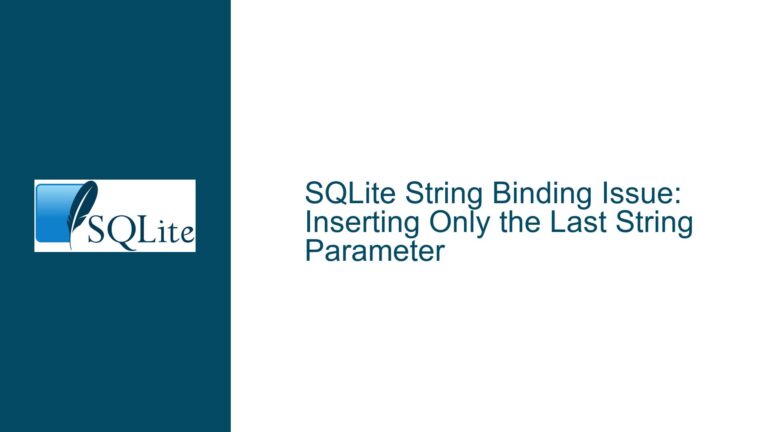Handling Default Column Values in SQLite Prepared Statements
SQLite Prepared Statements and Default Column Values
When working with SQLite, one common scenario involves inserting data into a table where some columns have default values defined in the table schema. These default values are typically specified during the table creation using the DEFAULT clause in the Data Definition Language (DDL). For example, a table might be created with a column that defaults to the current timestamp or a specific static value if no value is provided during an insert operation.
The challenge arises when using prepared statements to insert data into such tables. Prepared statements are a powerful feature in SQLite that allow for efficient execution of repeated SQL commands with different parameters. They are particularly useful in applications where the same SQL statement is executed multiple times with varying inputs, such as in batch processing or real-time data ingestion systems.
In a typical prepared statement, parameters are bound to specific values using functions like sqlite3_bind_int, sqlite3_bind_text, or sqlite3_bind_blob. However, there is no direct way to bind a parameter to the default value of a column if the value for that column is unknown or should not be explicitly provided. This limitation can lead to cumbersome workarounds, such as creating multiple prepared statements—one for each possible combination of columns that might be excluded—or binding NULL values, which may not always trigger the default value mechanism as intended.
The core issue here is the lack of a built-in mechanism in SQLite’s C API to bind a parameter to a column’s default value directly. This can be particularly problematic in scenarios where the application logic dynamically determines which columns should be populated with explicit values and which should fall back to their defaults. Without a straightforward way to handle this, developers are forced to write additional code to manage different prepared statements or manually construct SQL queries on the fly, which can be error-prone and inefficient.
Interrupted Write Operations Leading to Index Corruption
The absence of a direct method to bind a parameter to a column’s default value in SQLite can lead to several potential issues, particularly in applications that rely heavily on prepared statements for data insertion. One of the primary concerns is the risk of inadvertently inserting NULL values into columns that have default values defined. This can happen if the application logic mistakenly binds a NULL value to a parameter, thinking that it will trigger the default value mechanism. However, in SQLite, binding a NULL value explicitly is different from omitting the column from the insert statement altogether. Explicit NULL values will be inserted as-is, potentially overriding the default value specified in the DDL.
Another issue arises when dealing with complex table schemas that include multiple columns with default values. In such cases, the application may need to dynamically generate different prepared statements depending on which columns are to be populated with explicit values and which should use their defaults. This can lead to a proliferation of prepared statements, each tailored to a specific combination of columns. Managing these statements can become unwieldy, especially in large applications with many tables and columns.
Furthermore, the lack of a direct binding mechanism for default values can complicate the process of data migration or bulk data insertion. In these scenarios, the application may need to handle a wide variety of data formats or sources, each with different sets of available columns. Without a straightforward way to bind default values, the application may need to perform additional preprocessing to determine which columns should be included in each insert operation, adding complexity and potential points of failure.
In some cases, developers may resort to using raw SQL queries instead of prepared statements to work around this limitation. While this approach can provide more flexibility in terms of dynamically constructing queries, it also introduces risks such as SQL injection vulnerabilities if not handled carefully. Additionally, raw SQL queries can be less efficient than prepared statements, particularly when executing the same query multiple times with different parameters.
Implementing PRAGMA journal_mode and Database Backup
To address the issue of binding default values in SQLite prepared statements, developers can employ several strategies, each with its own trade-offs. One approach is to use the COALESCE function in SQL to handle default values within the SQL statement itself. The COALESCE function returns the first non-null value in its list of arguments, making it possible to specify a default value directly in the SQL query. For example, an insert statement could be written as follows:
INSERT INTO my_table (column1, column2) VALUES (?, COALESCE(?, 'default_value'));
In this example, if the second parameter is NULL, the COALESCE function will return 'default_value', effectively simulating the behavior of a default value. However, this approach requires that the default value be hardcoded into the SQL statement, which may not be ideal if the default value is subject to change or if it varies between different columns.
Another strategy is to use a combination of prepared statements and dynamic SQL generation. In this approach, the application logic determines which columns should be included in the insert operation and constructs the SQL query accordingly. For example, if a column should use its default value, it can be omitted from the INSERT statement entirely. This approach requires careful handling to ensure that the generated SQL queries are correct and secure, but it can provide the flexibility needed to handle a wide range of scenarios.
For applications that require a more robust solution, it may be necessary to extend the SQLite C API to support binding default values directly. This could involve creating a custom function, such as sqlite3_bind_default, that can be used in place of the standard binding functions when a parameter should use the column’s default value. Implementing such a function would require modifying the SQLite source code or creating a custom build, which may not be feasible for all projects. However, for those with the necessary resources and expertise, this approach can provide a clean and efficient solution to the problem.
In addition to these strategies, it is important to consider the broader context of database management and maintenance. For example, using the PRAGMA journal_mode command can help ensure data integrity in the event of a crash or power failure, which is particularly important when dealing with complex insert operations that involve default values. Setting the journal mode to WAL (Write-Ahead Logging) can provide better performance and reliability, especially in high-concurrency environments.
Finally, regular database backups are essential to protect against data loss or corruption. In the context of handling default values, backups can provide a safety net in case of errors or unexpected behavior during insert operations. By maintaining up-to-date backups, developers can quickly recover from issues and ensure that the database remains in a consistent state.
In conclusion, while SQLite does not provide a built-in mechanism for binding default values in prepared statements, there are several strategies that developers can use to work around this limitation. Whether through the use of COALESCE, dynamic SQL generation, or custom extensions to the SQLite API, it is possible to achieve the desired behavior with careful planning and implementation. Additionally, adopting best practices such as using PRAGMA journal_mode and maintaining regular backups can help ensure the overall reliability and integrity of the database.






